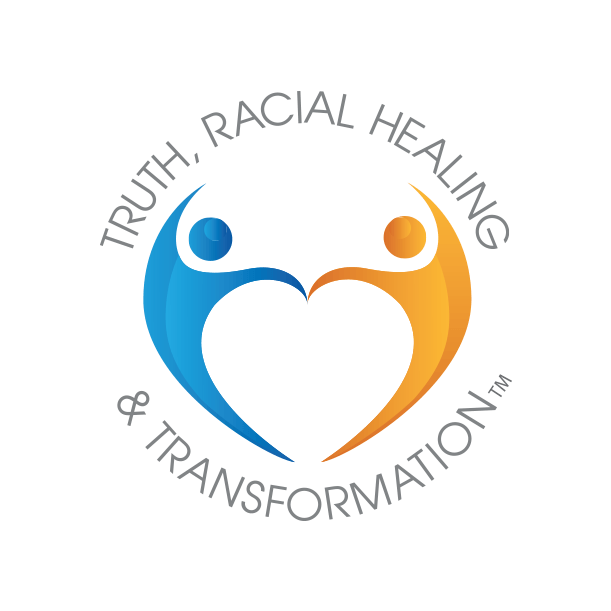
Get Involved
Sign up for our TRHT mailing list for updates and resources.

Sign up for our TRHT mailing list for updates and resources.

Truth, Racial Healing & Transformation (TRHT) is a comprehensive, multi-year national and community-based process to bring about transformational and sustainable change. Through TRHT, partners address the historic and contemporary effects of racism in their communities and institutions. They work to replace the deeply held belief system that fuels racism with one that sees the inherent value of all people. This holistic approach addresses mind and heart, the interpersonal and systemic, and places the power of authentic, trust-based solidarity at the center.
Racism impacts all of us, whether we are aware of it or not. The effects of racism are evident everywhere: in the places where we live, learn, work and play, in our social interactions and in our systems and policies. People experience these effects when they take their children to school, apply for jobs, rent or buy a home, visit a doctor, try to access healthy food, in interactions with the police and more. Systemically, racism is one of the biggest obstacles to solving the challenges we face in our communities.
Through TRHT, participants build relationships, trust and collective power at the community and institutional level. These relationships lay the groundwork for powerful systemic change, as community partners re-envision and reshape their institutions, policies and practices.
Racial healing is at the heart of racial equity. Racial healing is about:
Without racial healing and building trust, changes in policies or practices are short-lived. Through healing and relationship-building, we can collectively develop new values that affect our everyday decisions in areas of policy making, hiring, education and housing – to name just a few.
play_circle_outlineWatch How TRHT is Making an ImpactThe TRHT framework helps communities heal and produce actionable change. From the beginning, TRHT was designed by community and through collaboration. Community-led collaboration – that is cross-racial, intergenerational and cross-sector – remains the centerpiece of all TRHT efforts.
Through a series of discussions, utilizing the process described in the TRHT Implementation Guidebook, communities and organizations gain an understanding of the predominant factors and conditions that are blocking progress.
Participants then devise plans for transformation within five interrelated areas.
The two foundational areas all TRHT communities address are:
Communities also choose to pursue work around one or all of the following pillars:
False narratives hamper our ability to understand our world and relationships as they are, leading us to create and reinforce perceptions that are untrue. A more complete story needs to be presented in school curricula, news media, movies, television, radio, digital media, gaming platforms, cultural institutions, and in the personal histories told within families. This process influences our perspectives, perceptions, behaviors and interactions with one another so that we can more effectively create change.
Focusing on ways for all of us to heal from the wounds of the past, to build mutually respectful relationships across racial and ethnic lines that honor and value each person’s humanity, and to build trusting intergenerational and diverse community relationships that better reflect our common humanity.
Examining and finding ways to address segregation, colonization and concentrated poverty in neighborhoods to ultimately ensure equitable access to health, education and jobs.
Reviewing discriminatory civil and criminal laws and the public policies that come from them and recommending solutions that will produce a just application of the law.
Studying structured inequality and barriers to economic opportunities and recommending approaches that can create an equitable society.
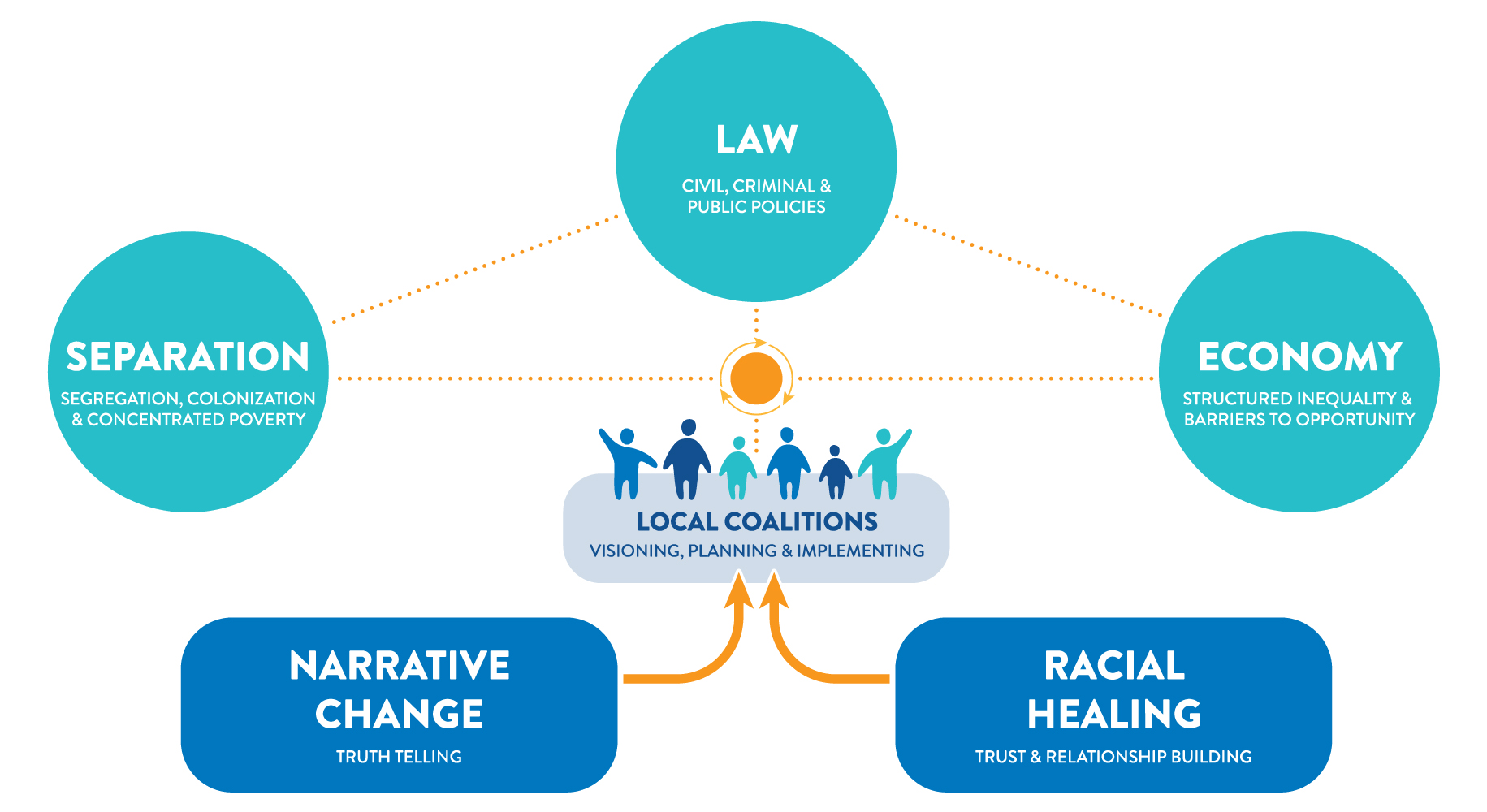
TRHT emerged in 2016 as an approach to racial equity work that connects healing with systemic transformation. Launched by the W.K. Kellogg Foundation, TRHT was designed in partnership with 176 leaders and scholars, representing more than 144 organizations. Since then, TRHT has expanded well beyond WKKF’s grantee partners and now exists in communities, in organizations and on college campuses across the United States.
Communities across the United States experience everyday disruptions and confront major crises born of racism. Transforming the systems in which racism is embedded takes each one of us, in each of our communities, sectors and spheres of influence. It requires individual and collective commitments to racial healing, building the relationships and mobilizing the energy for transformative vision, plans and action.
The following communities and their coordinating organizations have undertaken a TRHT process with the following intentions:
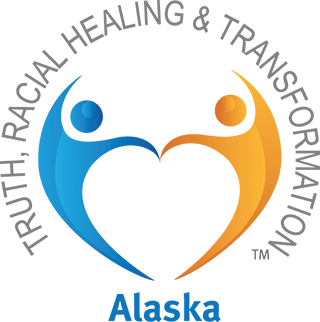
Starting in 2017, Alaska TRHT developed a relational platform for transformation, which included an extensive network of “accountability partners” or people with the power to transform systems. Accountability partners were asked to support efforts related to Indigenous language education; transformation of public education; and the advancement of policies that center Alaska Native stewardship and protect Alaska Native ways of being. In addition, they trained media outlets on racial equity and invited them to be accountability partners.

Battle Creek, Mich.
The intentional growth of the Battle Creek Coalition for Truth, Racial Healing and Transformation since 2017 has served as a launching pad for significant cross racial movement building work locally. With Battle Creek Community Foundation serving as the fiscal sponsor for this work, the Coalition for TRHT has convened and connected individuals and organizations seeking opportunities to advance racial healing and equity in the community. Partners operationalize shared values and commitment to the mission and work towards the transformative aspect of the TRHT model to shift power that will lead to systems change. Via a participatory strategic planning process completed in 2021, the volunteer Community Leadership Team of the Coalition identified the strategic priorities, goals and objectives for TRHT’s work in racial healing and relationship building; moving beyond separation; and promoting narrative change.
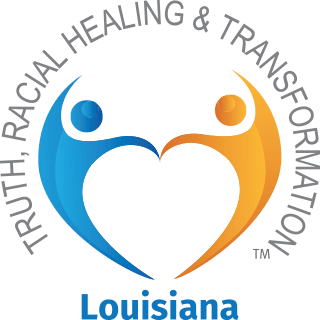
The Foundation for Louisiana (FFL) honors the knowledge and wisdom of local communities, addresses Louisiana's most pressing issues and invests statewide in work to advance freedom. TRHT New Orleans and Baton Rouge recognize that justice spaces, often made up of Black, Indigenous and people of color (BIPOC), are directly affected by inequitable systems that impact their ability to lead and sustain transformative change. TRHT addresses the racial healing and separation Pillars in both places by lifting up the pre-existing racial healing, healing justice and mutual aid efforts in communities. TRHT Baton Rouge and New Orleans piloted the Racial Healing Justice Practitioners Participatory Fund to resource healing practitioners who have already been embedded in the community. It allowed for improved access to healing and restorative services while advancing the goal of democratizing philanthropy in Louisiana. FFL will build on work done in TRHT Baton Rouge, developing leadership in housing and police reform and launch the next iteration of the TOGETHER Initiative: Leadership, Education, Advocacy, and Development (LEAD), which will focus on racial healing and healing justice. LEAD is a three-part strategy designed to strengthen residents' engagement in decision-making about issues impacting their communities.
content_copyVisit Website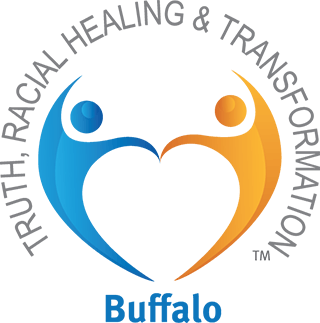
Every system that touches the lives of children and families is being influenced by TRHT Buffalo, including criminal & juvenile justice, workforce, family support, transportation, the corporate sector and faith communities. Acknowledging that inequitable practices in one system are reinforced by other systems, racial healing and transformation efforts have grown within and across each of these sectors.
content_copyVisit Website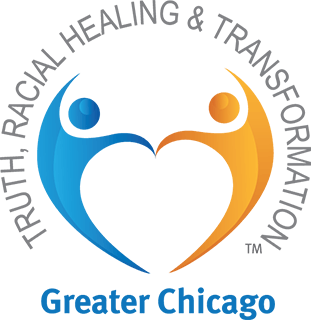
In 2017, 300 people from across the metropolitan region collaboratively developed a vision of Chicago without racism, defined community priorities and developed strategies to reach their goals. Racial healing was front and center through the training of healing practitioners from downtown through neighborhoods and into the suburbs in 2020. In 2022, they began incorporating work in law and policy through the Truth, Healing and Equity Fellowship, which aims to build capacity for creating equitable organizations.
content_copyVisit Website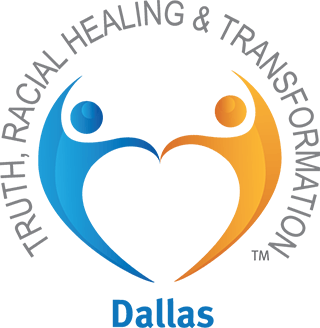
From day one, TRHT Dallas grounded their work in truth-telling, starting with compiling the racial history of the community, including documenting historical policies and practices. They engaged the community’s young people and representatives of law enforcement, philanthropy and virtually every sector in the community to envision “a radically inclusive” Dallas. This led to the creation of Racial Equity NOW, which builds the capacity of organizations and leaders around racial equity and policy implementation.
content_copyVisit Website
Flint, Mich.
There’s a growing synergy in Flint for lifting up truth-telling work and TRHT is the capstone to our healing efforts. Together with community partners, we are addressing systemic issues through truth-telling workshops, oral histories, historical neighborhood redevelopment and civic engagement.
The Community Foundation’s COVID-19 Taskforce on Racial Inequities early on recognized health disparities among people of color. Volunteers drafted a strategic plan to operationalize racism as a public health issue. Through committee work, volunteers were actively involved in public health outreach and advising grants for vaccine clinics, personal protective equipment and promotional campaigns.
Flint’s narrative change work continues as we share accounts of the history of Flint neighborhoods, the impact of Fair Housing legislation and current urban renewal development.

Kalamazoo, Mich.
Truth, Racial Healing & Transformation (TRHT) Kalamazoo, hosted by the Kalamazoo Community Foundation, approaches the five areas of the TRHT framework as interconnected. They have examined the relationships between the five areas and are applying the findings to build projects to support various intersections of the work. Racial healing and centering deep relationships continue to be at the core of their work while promoting collaboration across the county as the key to community transformation. Currently, TRHT Kalamazoo is addressing fair housing practices, eviction mitigation, examining local curricula for equity, transparency in the local criminal justice system, the needs of Black and Brown small business owners and creating a local history database. In addition, the Kalamazoo Community Foundation is using the TRHT framework to inform its public policy agenda to advance its vision of Kalamazoo County as the most equitable place to live by centering the needs of the residents of Kalamazoo County.

Lansing, Mich.
The One Love Global Center for Truth, Racial Healing & Transformation is a hub and learning community that celebrates Blackness, dismantles oppressive human hierarchies and upholds beloved community characterized by love, accountability, mutual support and creative cohesion. We center Black youth as leaders and build intergenerational power toward equitable policy and systems transformation at the intersections of educational, economic and environmental justice. Through racial healing circles, we ground our community in Indigenous practices and storytelling to see our common humanity and explore justice that heals. Highlights from our formative work implementing the TRHT process in Metro Lansing include launching the Lansing People’s Assembly, Freedom Summer Youth Organizing School, Lansing Racial Equity Scorecard, Racial Equity Accountability Process, and transformative partnerships with the local economic development formation, county prosecutor’s office, and school district.
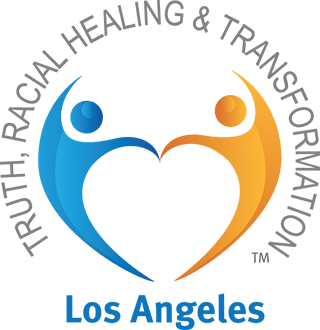
From 2017-2022, TRHT Los Angeles made significant advances in racial healing, narrative change and the economy. Building understanding of the racialized history of their area and ongoing impacts, they studied the incarceration of Japanese-Americans during WW2, the history of colonization and the 1871 Chinese Massacre. Collaborators successfully initiated a campaign leading to the recognition of three new public holidays and installation of new monuments and collaborated with the LA County Arts Commission and Echo Park Film Center on arts-based narrative change work. TRHT Los Angeles also offered implicit bias trainings across the philanthropy, nonprofit, corporate and business sectors and partnered with the LA Chamber of Commerce to advocate for immigrant workers and an inclusive workforce. Dialogues with grassroots organizations and members across various LA communities led to the formation of the first ever Los Angeles Office of Racial Equity.
content_copyVisit Website
TRHT Mississippi will focus on bringing people together to bridge divides by working with other organizations. Our goal is to broaden and deepen the community of people from across the state who are engaged in racial healing so that everyone can heal from the wounds of the past and build mutually respectful cross-racial relationships. We will focus on creating and monitoring data about racial healing and the racial realities in Mississippi and look forward to establishing shared practices for actualizing racial equity in Mississippi to remove inequality and create opportunity at the structural and systemic levels. This will require looking at the discriminatory civil and criminal laws, and it also requires elevating the culture and voices of residents who are the “experts” on their own communities to learn about the ways people and communities with limited resources care for and help each other so they can live out their full potential in society.
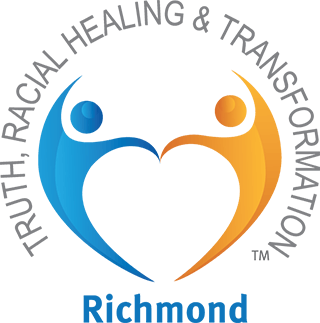
Utilizing the therapeutic effects of creativity, from 2017-2020 TRHT Richmond focused on narrative change and brought together local artists: unearthing historical narratives, telling truths about the community’s past and engaging local residents in envisioning a more equitable future. Artists shared these narratives and visions through visual art, movement and yoga, documentaries, books and websites and covered subjects such as food injustice, wellness, the local history of Black women’s labor, gentrification, obesity and self-esteem. Trainings encouraged faith leaders to bring racial healing messages and racial equity practices to their congregations and communities.
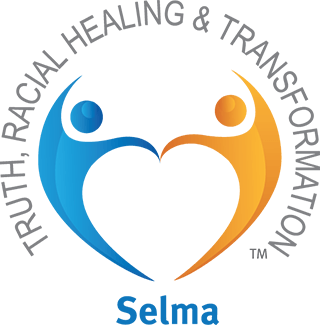
TRHT Selma is addressing all five pillars, grounded in wide community engagement through a Grassroots Advisory Team and a Multi-Sector Team. Collaborators are utilizing innovative approaches to combining racial healing with narrative change including: a series on the history of race in the U.S. paired with Kingian Nonviolence trainings; a Know Your Roots project related to discovering ancestors’ roles in history; and a Middle Passage reenactment. With the separation and law pillars, TRHT Selma focuses on restorative justice and nonviolent conflict resolution in local schools, community-police dialogues and conflict resolution processes to reduce violence and incarceration. Economy work centers on developing a sustainable tourism industry in Selma, supporting entrepreneurs, training women in financial literacy and developing an organizing model to confront gentrification and displacement.
content_copyVisit Website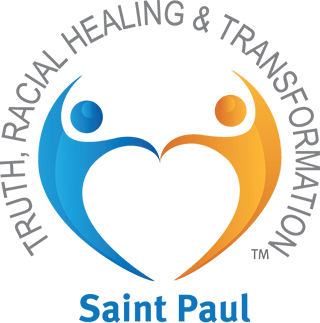
From 2017-2019, TRHT Saint Paul focused on narrative change, forming a partnership among six media outlets. Partners included large, well-resourced, nationally known organizations and small, community-led organizations. Their collaboration offered media professionals an opportunity to meet, build trust and learn about the impact of negative narratives on people and communities of color. TRHT Saint Paul also engaged young Black men and boys in designing a media campaign named for Gordon Parks, the internationally known photographer and filmmaker who first picked up a camera during his teen years in Saint Paul. The mentorship program assisted youth to develop new internal narratives and visions.
content_copyVisit Website
Starting in 2017, Alaska TRHT developed a relational platform for transformation, which included an extensive network of “accountability partners” or people with the power to transform systems. Accountability partners were asked to support efforts related to Indigenous language education; transformation of public education; and the advancement of policies that center Alaska Native stewardship and protect Alaska Native ways of being. In addition, they trained media outlets on racial equity and invited them to be accountability partners.

Battle Creek, Mich.
The intentional growth of the Battle Creek Coalition for Truth, Racial Healing and Transformation since 2017 has served as a launching pad for significant cross racial movement building work locally. With Battle Creek Community Foundation serving as the fiscal sponsor for this work, the Coalition for TRHT has convened and connected individuals and organizations seeking opportunities to advance racial healing and equity in the community. Partners operationalize shared values and commitment to the mission and work towards the transformative aspect of the TRHT model to shift power that will lead to systems change. Via a participatory strategic planning process completed in 2021, the volunteer Community Leadership Team of the Coalition identified the strategic priorities, goals and objectives for TRHT’s work in racial healing and relationship building; moving beyond separation; and promoting narrative change.

The Foundation for Louisiana (FFL) honors the knowledge and wisdom of local communities, addresses Louisiana's most pressing issues and invests statewide in work to advance freedom. TRHT New Orleans and Baton Rouge recognize that justice spaces, often made up of Black, Indigenous and people of color (BIPOC), are directly affected by inequitable systems that impact their ability to lead and sustain transformative change. TRHT addresses the racial healing and separation Pillars in both places by lifting up the pre-existing racial healing, healing justice and mutual aid efforts in communities. TRHT Baton Rouge and New Orleans piloted the Racial Healing Justice Practitioners Participatory Fund to resource healing practitioners who have already been embedded in the community. It allowed for improved access to healing and restorative services while advancing the goal of democratizing philanthropy in Louisiana. FFL will build on work done in TRHT Baton Rouge, developing leadership in housing and police reform and launch the next iteration of the TOGETHER Initiative: Leadership, Education, Advocacy, and Development (LEAD), which will focus on racial healing and healing justice. LEAD is a three-part strategy designed to strengthen residents' engagement in decision-making about issues impacting their communities.
content_copyVisit Website
Every system that touches the lives of children and families is being influenced by TRHT Buffalo, including criminal & juvenile justice, workforce, family support, transportation, the corporate sector and faith communities. Acknowledging that inequitable practices in one system are reinforced by other systems, racial healing and transformation efforts have grown within and across each of these sectors.
content_copyVisit Website
In 2017, 300 people from across the metropolitan region collaboratively developed a vision of Chicago without racism, defined community priorities and developed strategies to reach their goals. Racial healing was front and center through the training of healing practitioners from downtown through neighborhoods and into the suburbs in 2020. In 2022, collaborators began incorporating work in law and policy through the Truth, Healing and Equity Fellowship, which aims to build capacity for creating equitable organizations.
content_copyVisit Website
From day one, TRHT Dallas grounded their work in truth-telling, starting with compiling the racial history of the community, including documenting historical policies and practices. Collaborators engaged the community’s young people and representatives of law enforcement, philanthropy and virtually every sector in the community to envision “a radically inclusive” Dallas. This led to the creation of Racial Equity NOW, which builds the capacity of organizations and leaders around racial equity and policy implementation.
content_copyVisit Website
Flint, Mich.
There’s a growing synergy in Flint for lifting up truth-telling work and TRHT is the capstone to our healing efforts. Together with community partners, we are addressing systemic issues through truth-telling workshops, oral histories, historical neighborhood redevelopment and civic engagement.
The Community Foundation’s COVID-19 Taskforce on Racial Inequities early on recognized health disparities among people of color. Volunteers drafted a strategic plan to operationalize racism as a public health issue. Through committee work, volunteers were actively involved in public health outreach and advising grants for vaccine clinics, personal protective equipment and promotional campaigns.
Flint’s narrative change work continues as we share accounts of the history of Flint neighborhoods, the impact of Fair Housing legislation and current urban renewal development.

Kalamazoo, Mich.
Truth, Racial Healing & Transformation (TRHT) Kalamazoo, hosted by the Kalamazoo Community Foundation, approaches the five areas of the TRHT framework as interconnected. They have examined the relationships between the five areas and are applying the findings to build projects to support various intersections of the work. Racial healing and centering deep relationships continue to be at the core of their work while promoting collaboration across the county as the key to community transformation. Currently, TRHT Kalamazoo is addressing fair housing practices, eviction mitigation, examining local curricula for equity, transparency in the local criminal justice system, the needs of Black and Brown small business owners and creating a local history database. In addition, the Kalamazoo Community Foundation is using the TRHT framework to inform its public policy agenda to advance its vision of Kalamazoo County as the most equitable place to live by centering the needs of the residents of Kalamazoo County.

Lansing, Mich.
The One Love Global Center for Truth, Racial Healing & Transformation is a hub and learning community that celebrates Blackness, dismantles oppressive human hierarchies and upholds beloved community characterized by love, accountability, mutual support and creative cohesion. We center Black youth as leaders and build intergenerational power toward equitable policy and systems transformation at the intersections of educational, economic and environmental justice. Through racial healing circles, we ground our community in Indigenous practices and storytelling to see our common humanity and explore justice that heals. Highlights from our formative work implementing the TRHT process in Metro Lansing include launching the Lansing People’s Assembly, Freedom Summer Youth Organizing School, Lansing Racial Equity Scorecard, Racial Equity Accountability Process, and transformative partnerships with the local economic development formation, county prosecutor’s office, and school district.

From 2017-2022, TRHT Los Angeles made significant advances in racial healing, narrative change and the economy. Building understanding of the racialized history of their area and ongoing impacts, they studied the incarceration of Japanese-Americans during WW2, the history of colonization and the 1871 Chinese Massacre. Collaborators successfully initiated a campaign leading to the recognition of three new public holidays and installation of new monuments and collaborated with the LA County Arts Commission and Echo Park Film Center on arts-based narrative change work. TRHT Los Angeles also offered implicit bias trainings across the philanthropy, nonprofit, corporate and business sectors and partnered with the LA Chamber of Commerce to advocate for immigrant workers and an inclusive workforce. Dialogues with grassroots organizations and members across various LA communities led to the formation of the first ever Los Angeles Office of Racial Equity.
content_copyVisit Website
TRHT Mississippi will focus on bringing people together to bridge divides by working with other organizations. Our goal is to broaden and deepen the community of people from across the state who are engaged in racial healing so that everyone can heal from the wounds of the past and build mutually respectful cross-racial relationships. We will focus on creating and monitoring data about racial healing and the racial realities in Mississippi and look forward to establishing shared practices for actualizing racial equity in Mississippi to remove inequality and create opportunity at the structural and systemic levels. This will require looking at the discriminatory civil and criminal laws, and it also requires elevating the culture and voices of residents who are the “experts” on their own communities to learn about the ways people and communities with limited resources care for and help each other so they can live out their full potential in society.

Utilizing the therapeutic effects of creativity, from 2017-2020 TRHT Richmond focused on narrative change and brought together local artists: unearthing historical narratives, telling truths about the community’s past and engaging local residents in envisioning a more equitable future. Artists shared these narratives and visions through visual art, movement and yoga, documentaries, books and websites and covered subjects such as food injustice, wellness, the local history of Black women’s labor, gentrification, obesity and self-esteem. Trainings encouraged faith leaders to bring racial healing messages and racial equity practices to their congregations and communities.

TRHT Selma is addressing all five pillars, grounded in wide community engagement through a Grassroots Advisory Team and a Multi-Sector Team. Collaborators are utilizing innovative approaches to combining racial healing with narrative change including: a series on the history of race in the U.S. paired with Kingian Nonviolence trainings; a Know Your Roots project related to discovering ancestors’ roles in history; and a Middle Passage reenactment. With the separation and law pillars, TRHT Selma focuses on restorative justice and nonviolent conflict resolution in local schools, community-police dialogues and conflict resolution processes to reduce violence and incarceration. Economy work centers on developing a sustainable tourism industry in Selma, supporting entrepreneurs, training women in financial literacy and developing an organizing model to confront gentrification and displacement.
content_copyVisit Website
From 2017-2019, TRHT Saint Paul focused on narrative change, forming a partnership among six media outlets. Partners included large, well-resourced, nationally known organizations and small, community-led organizations. Their collaboration offered media professionals an opportunity to meet, build trust and learn about the impact of negative narratives on people and communities of color. TRHT Saint Paul also engaged young Black men and boys in designing a media campaign named for Gordon Parks, the internationally known photographer and filmmaker who first picked up a camera during his teen years in Saint Paul. The mentorship program assisted youth to develop new internal narratives and visions.
content_copyVisit WebsiteLaunched in 2016, TRHT is a comprehensive, national and community-based process to plan for and bring about transformational and sustainable change, and to address the historic and contemporary effects of racism. At its core, TRHT unearths the deeply held, and often unconscious, beliefs that undergird racism – the main one being the belief in a “hierarchy of human value.” This belief fuels the perception of inferiority or superiority based on race, physical characteristics or place of origin, which then manifests in our systems, laws, policies and personal practices. TRHT seeks to establish the equal value of all human beings as the new foundational belief for our society and its systems.
TRHT helps communities across the U.S. embrace racial healing and uproot the conscious and unconscious belief in a hierarchy of human value that limits equal access to quality education, fulfilling employment, safe neighborhoods, equal housing opportunities and quality health care. Unless the central belief system that fuels racial, ethnic, and place of origin inequities is challenged and changed, societal progress cannot be sustained over time.
Throughout its 2016 design phase, WKKF worked with 176 leaders and scholars as representatives of more than 144 national TRHT individual and organizational partners, with a reach of more than 289 million people. The result of those efforts was a set of recommendations and an Implementation Guidebook to inform community-based TRHT processes. In 2017, multi-sector collaborations emerged in 14 places across the United States and received Kellogg Foundation grants, in addition to other national, regional and local funding, to implement a TRHT process. In 2022, TRHT expanded to the state of Mississippi and a national community of practice formed to expand the reach of TRHT so more individuals and organizations can begin or continue their work to heal from the impacts of racism while making structural and systems changes within their communities.
The W.K. Kellogg Foundation supports TRHT work in: (1) Battle Creek, Mich.; (2) Buffalo, NY; (3) Kalamazoo, Mich., (4) the State of Mississippi; (5) New Orleans and Baton Rouge, LA; and (6) Selma, AL. TRHT has expanded in communities well beyond WKKF’s grantee partners and also takes place on college campuses and libraries throughout the United States through the American Association of Colleges and Universities and the American Library Association.
The TRHT framework is built from the legacy and history of TRCs across multiple countries. It is an effort that is not only rooted in justice and truth-telling, but also designed to focus on healing and societal transformation. There is much to be learned from TRC experiences as we work toward transformation in the U.S., where there has never been a widespread, intentionally designed opportunity to heal from our history of genocide, colonization, enslavement and forced segregation. If our past shapes the present, perhaps a TRC at the time of the American Revolution or during the late-19thcentury Reconstruction era would have positioned us differently in the present. Now, however, is the time to shape our future. While designing the framework for Truth, Racial Healing & Transformation in the U.S., we moved away from the term reconciliation. Reconciling connotes restoration of friendly relations—“reuniting” or “bringing together again after conflict.” It also implies a preexisting harmony and unity among groups, which is not the case in the United States amid a deeply entrenched system of racial hierarchy and colonization. There is no time period in our collective, national history that we could return to and experience racial equity and wholeness.
The Kellogg Foundation has committed over $32 million to date supporting TRHT places. Each place that has been funded received a grant investment for planning and implementing their TRHT and in a growth fund to sustain the work for the long-term locally. The growth fund is also a place where additional funding is being raised and matched by other national, regional and local foundations.
TRHT is expanding through a network of communities across the country. The framework is available to any community, organization or individual ready to pursue racial healing as part of their racial equity journey. At this time, the Kellogg Foundation is not actively seeking proposals from other places interested in doing a TRHT process. However, the TRHT Implementation Guidebook available on (add link) can be downloaded by any individual or group of people interested in sustainable racial healing and racial equity work.
To heal is to restore to wholeness; to repair damage; and to set right. Healing a societal racial divide requires recognition of the need to acknowledge the wrongs of the past, while addressing the consequences of those wrongs.
Yes. The TRHT process is a comprehensive effort. It includes conversation and dialogue as essential components. However, as participants get to know one another and build relationships, the process also involves developing a plan for creating transformational change in one or more areas: the economy, the law and separation (the things that keep us apart like residential segregation and colonization.)
Racism affects all people from all backgrounds. Racial healing is a process that can benefit all people because we are all living in and affected by the same racialized world. All of us can benefit from participating in racial healing work and the deep, meaningful relationships that can emerge. It is not one person’s, one group’s or one organization’s responsibility to engage in racial healing and work toward creating a more equitable future. The responsibility belongs to all of us.
Narrative change means examining how to create and distribute new narratives in entertainment, the media, school curricula, museums, monuments and parks, and in the ways we communicate that can influence people’s perspectives, perceptions and behaviors about and towards one another – so that we can work more effectively and productively towards community-based change. At times this may mean that we need to tell necessary and uncomfortable truths. This can be restorative because it can acknowledge the pain and suffering of racism and the resistance and resilience of those impacted. The TRHT supports people of all ages, races, ethnicities, faiths, cultures and socioeconomic statuses coming together to shape narratives about the past, present, and future – complete and accurate stories that honor the full complexity of our humanity as the country forges a more equitable future.

The W.K. Kellogg Foundation (WKKF) originated with our founder’s vision to provide for the health, happiness and wellbeing of children—an aim that continues as the foundation’s north star today.
In 2007, the foundation determined that racism intensified conditions that block the pursuit of health, happiness and wellbeing of all children. At that time, the board of trustees committed WKKF to becoming an effective anti-racist organization.
In 2015, the WKKF Board of Trustees decided it was time to launch a new process to address the ongoing and seemingly intractable reach and impacts of racism in America and Truth, Racial Healing and Transformation was initiated. Dr. Gail Christopher, senior advisor and vice president for TRHT during that era, led the work to engage over 144 national partners and, with them, develop and pilot the framework and process.

The W.K. Kellogg Foundation (WKKF) was founded in 1930 by breakfast cereal innovator and entrepreneur Will Keith Kellogg. When he established the foundation, he said, “Use the money as you please, so long as it promotes the health, happiness and well-being of children.”
Today, WKKF remains committed to ensuring all children and families – regardless of race or income – have opportunities to reach their full potential. We want all children to live a full life with high-quality, early childhood education and access to good food and health care; to grow up in homes with families that have stable, high-quality jobs; and to live in a community where they are nurtured. Embedded within all that we do is our commitment to racial equity, to developing leaders and to engaging communities in solving their own problems.
WKKF supports this work nationally throughout the United States and with sovereign tribes, and in Mexico and Haiti. And, we concentrate up to two-thirds of our grantmaking in what we call priority places: Michigan, Mississippi, New Mexico and New Orleans in the U.S., Chiapas and the Yucatán Peninsula in Mexico, and in Central and South Haiti.